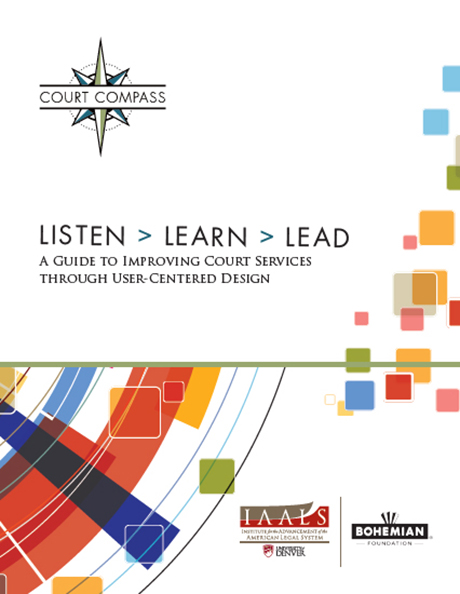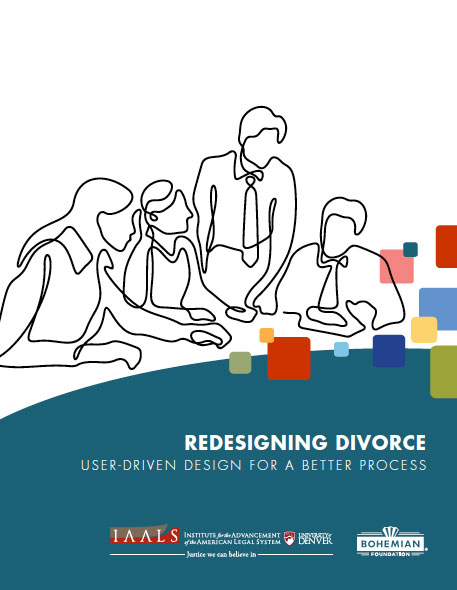The family justice system was built on the assumption that litigants would be represented by lawyers, but more and more family court litigants do not have attorneys. IAALS launched the Court Compass project to explore user-friendly, streamlined, and accessible solutions that help people through the divorce and separation process—even when they cannot afford to or choose not to hire an attorney.
Objective:
- To redesign and simplify the divorce process, making full use of the existing technological landscape and emerging tools and technologies.
More and more people in family court—the place where most Americans will interact with the justice system—are navigating the legal system without an attorney. For these people, excessively complex court processes create barriers to achieving fair outcomes.
The Court Compass project directly engaged court users in the process of designing a simpler process for divorce and separation. Throughout 2018, IAALS facilitated a series of user-centric design sprints where self-represented litigants and court stakeholders gathered to map out existing pain points in the process and prototype test solutions in real time, IAALS aims to use this work to inform the development of a simplified, technology-empowered process for divorcing and separating families.
Project Team:



As part of the preliminary project research for Court Compass, IAALS held a convening in 2016 on technology-enabled tools for litigants that highlighted both the challenges of current (and often disparate) technology solutions and the opportunities for increased integration between these solutions. A report on that event is available here.
IAALS next compiled a database of court technology offerings in production or in development around the country. The high-level findings and summary analysis were published in Mapping the Future of User Access through Technology and accompanied by maturity models to guide and facilitate integrated court solutions. This research helped identify both existing court resources and existing opportunities for innovative system solutions.

In partnership with experts at Stanford Law School’s Legal Design Lab, Northeastern School of Law’s NuLawLab, and the University of Maine School of Law, IAALS conducted interactive design workshops in a handful of jurisdictions around the country:
- January 26, 2018 – Andover, Massachusetts
- April 21, 2018 – Des Moines, Iowa
- May 5, 2018 – Andover, Massachusetts
- August 11, 2018 – Raleigh, North Carolina
- November 3, 2018 – Denver, Colorado
These workshops brought together self-represented litigants in divorce and separation cases along with court system insiders, such as judges, court staff, legal aid representatives, attorneys, and others to develop and test new processes and solutions in real time and refine them based on user feedback.
Publications
Listen > Learn > Lead
A Guide to Improving Court Services through User-Centered Design
Click here to read and download the guide.
This publication provides a practical “how to” guide for developing user-centered reforms through interactive design sprints. The guide offers a foundational understanding for using design sprints as a vehicle for engaging users and rapidly testing proposed solutions. While model design sprints were focused on divorce and separation cases, the guidance in herein is applicable to all kinds of civil and family case types, and the processes and tools in the guide can be applied by broader justice system stakeholders, as well as court systems.

Redesigning Divorce: User-Driven Design for a Better Process
Click here to read and download the report.
This report details our findings from our interactive design sprint workshops held across the country, where we led participants in identifying problems people face in navigating the legal process, brainstorming potential solutions to those problems, and creating prototypes for those solutions.
Through these workshops, we gained a deeper understanding of the problems and issues that self-represented litigants experience in the family court process—and how to contemplate solutions that take their perspectives into account.

- Margaret Hagan, Director of Legal Design Lab at Stanford Law School
- Dan Jackson, Executive Director of NuLawLab at Northeastern University School of Law
- Lois Lupica, University of Maine School of Law
- Iowa Judicial Branch
- North Carolina Judicial Branch
- North Carolina Equal Access to Justice Commission





